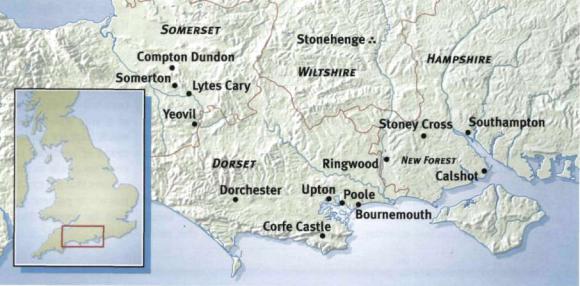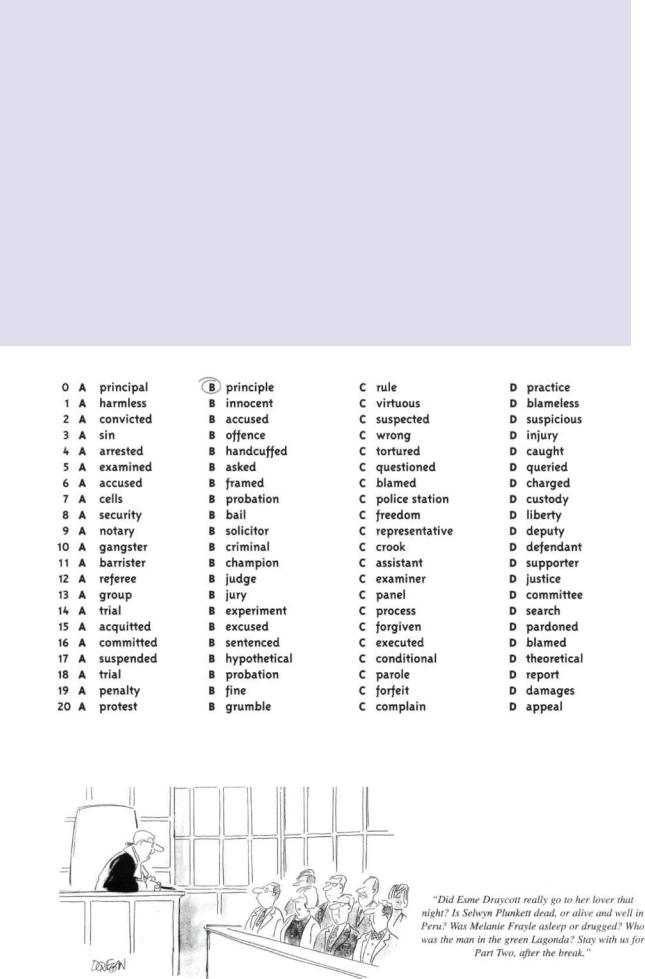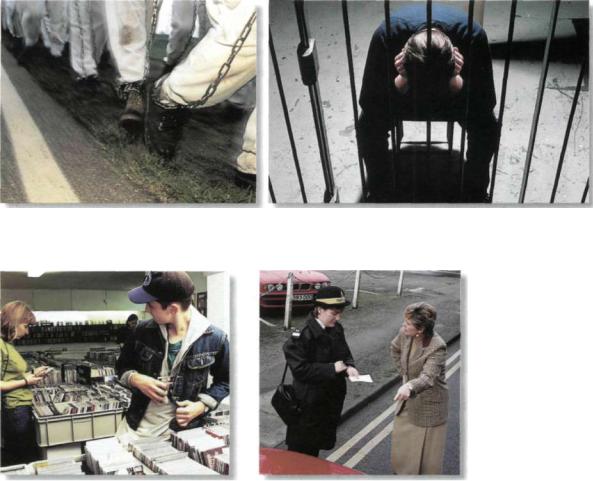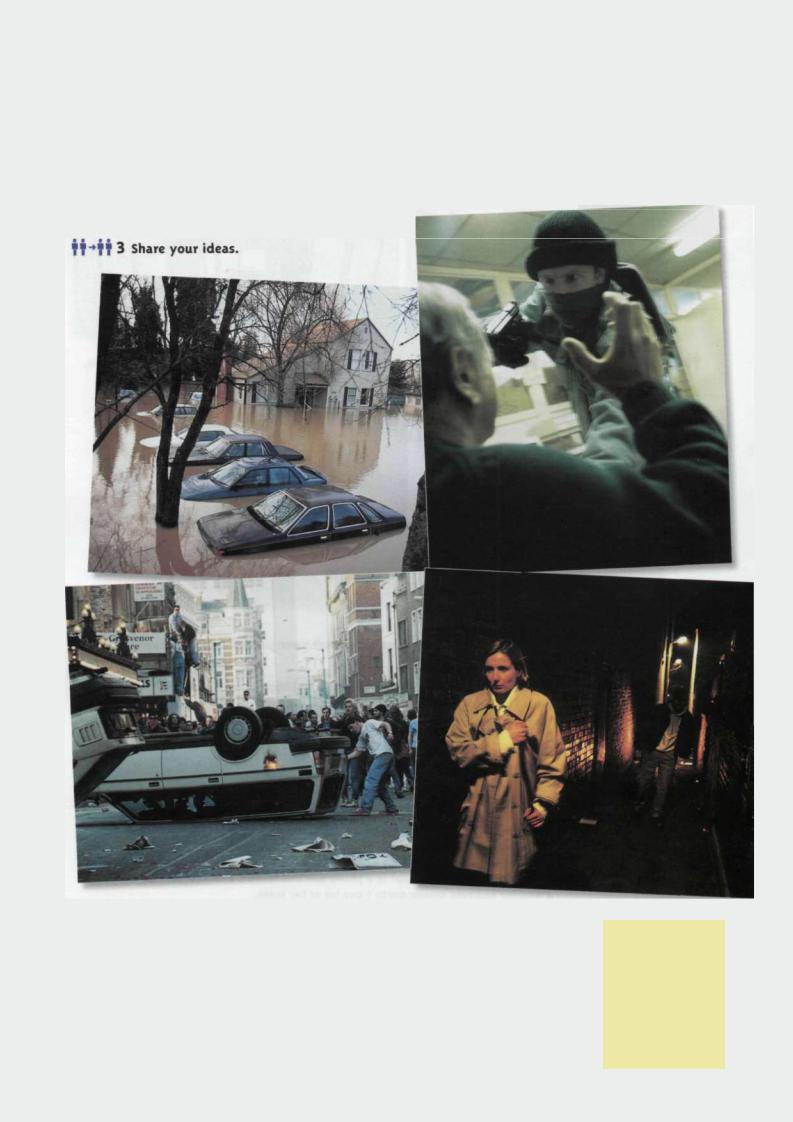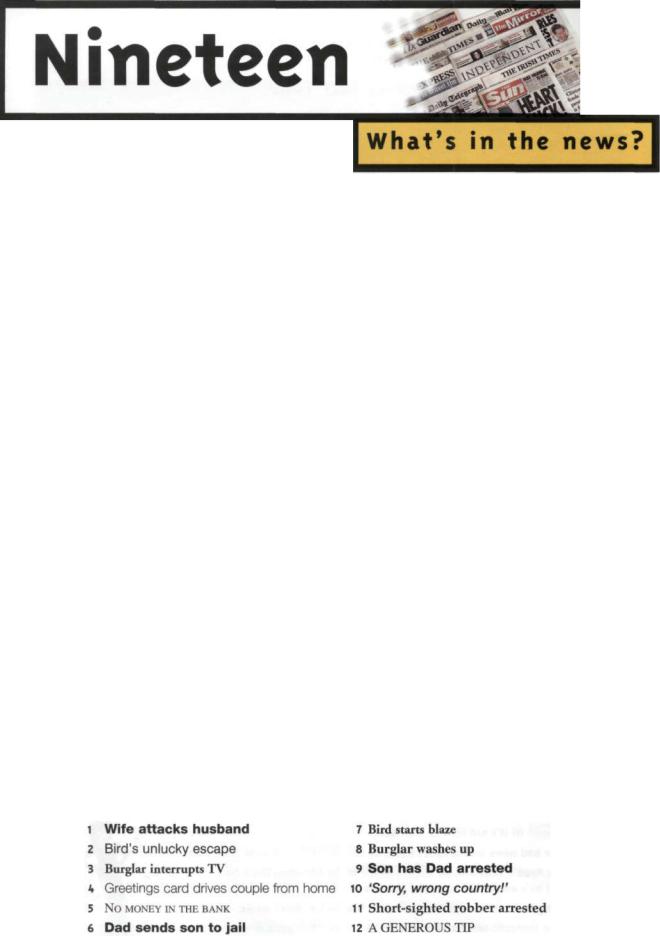
In the headlines
Vocabulary and Speaking
Ask your partners:
•which newspaper they normally read and why - or why they don't normally read one
•which sections they normally read and if they ever read the editorial (leader)
•if they prefer a tabloid (e.g. The Sun) or a quality daily (e.g. The Guardian)
Look at these newspaper headlines, which appeared on successive days in a newspaper. Can you explain what happened each day?
M Bus fares set to rise says report A wart his fan, flukedsayunf that (r\*s fevrts dHjvwg tv rue.
Tu |
"BUSES TO BE AXED IN BID TO CUT C O S T S " SAYS BUS CHIEF |
w |
Clash over threat to axe buses - passengers s l a m bus chief |
Th |
MINISTER BACKS BUS CHIEF |
F |
Bus chief quits over bus battle |
S |
MINISTER AXED AFTER CABINET SPLIT OVER BUS R O W |
11 Match these verbs which are often found in newspaper headlines with the more common verbs below:
axe/scrap back |
call |
clash curb grab |
loom oust quit slam soar swoop |
vow/pledge |
be imminent confiscate |
criticise disagree |
promise raid reduce/dismiss replace |
request |
resign restrict |
rise support |
|
|
2 Now do the same with these nouns which are used in newspaper headlines:
battle/clash/feud/row bid blaze chief drama fury/outrage link riddle split threat war
anger attempt connection disagreement division fire happening mystery person in charge/leader possibility rivalry
1 Can you guess what was the amusing story that followed each of these headlines?
2One of you should look at Activity 17, one at 30 and one at 36. Tell your partners the real stories - and find out if you guessed right!
Preparation §=€ Find an English-language newspaper and read it before the next lesson. Choose one article and make notes on the main points (or use a highlighter). Get ready to tell the rest of your group about your article in the next lesson.
13 studied at University College, London?
8 was in Holland yesterday?
9 is/was a doctor?
10 is/was 73?
11 was born in Berlin?
12 really died on Monday?
New Cambridge Advanced English
Don't believe everything you read . . .
Reading
1 Read this newspaper article and find out what mistake The Sun made.
2 Note down your answers to these questions:
Was it Dr Heinz Wolff (Or), Prof Heinz Wolff (Pro/) or both of them (Dr + Prof) who 1 died, according to The Sun?
2 is/was a bio-engineer?
3 is/was 61?
4 once lived in Hampstead?
5 presented a television programme?
6 studied at University College Hospital?
7 came to live in London?
Sun tribute cried the wrong Wolff
|
|
|
|
|
|
|
|
|
but The Sun had got the wrong |
|
Both |
Professor |
Heinz Wolff |
Ed Vulliamy |
|
|
|
|
|
|
|
|
|
|
|
Heinz Wolff. |
|
|
|
|
|
and Dr Heinz Wolff were born in |
|
|
|
|
|
|
|
|
|
|
|
|
|
|
|
|
|
|
|
Professor Heinz Wolff was in |
|
Berlin and settled in London. At |
PROFESSOR |
Heinz |
Wolff, |
the |
distinguished |
|
director |
of |
the |
|
Holland yesterday to make a |
|
one time, when Professor Wolff |
Brunei Institute for Bio- |
|
presentation |
to a |
research |
|
lived |
in |
Hampstead |
Garden |
engineering, |
|
whose |
tragic |
|
laboratory. "I have started to |
|
Suburb and Dr Wolff lived in |
death was reported in The Sun |
|
receive cards in the post |
|
Hampstead, |
their telephone |
last Monday, |
spoke |
cheerfully |
|
saying, 'I'm glad you are still |
|
numbers differed by one digit. |
enough |
to |
|
The |
Guardian |
|
alive'," he said. "The main |
|
Professor Wolff is a graduate |
yesterday, using not a ouija |
|
thing has been the tremendous |
|
of University |
College, |
London; |
board or spirit medium but a |
|
number of phone calls I've had |
|
Dr Wolff trained, and later |
telephone from a Dutch seaside |
|
to make - family, friends, |
|
became a department head, at |
town called Noordwijk. |
|
|
|
people who ask me to lecture |
|
University College Hospital. "We |
"Great Egg Race Prof Dies at |
|
to them or make videos; I'm |
|
have |
been |
confused |
before," |
61," announced The Sun, refer- |
|
still doing it." |
|
|
|
|
|
said Professor Wolff, "but never |
ring to Professor Wolff's role in |
|
When |
his |
death |
was |
|
in such a horrifying way." |
what the paper called the |
|
announced, organisers |
of |
a |
|
Several |
famous |
names have |
"loony |
inventions |
series" |
on |
|
meeting he was due to attend |
|
read of their own deaths in the |
BBC TV - and sparked off a |
|
decided to cancel, out of |
|
newspapers, the most celebra- |
bizarre |
chain |
of |
events |
|
respect, |
and |
telephoned |
his |
|
ted being Mark Twain, who |
throughout |
which |
Professor |
|
home to offer condolences. His |
|
complained that "reports of my |
Wolff remained alive and well. |
|
wife, Joan, said yesterday: |
|
|
death are grossly exaggerated". |
Within days of The Sun's |
|
"The |
switchboard |
at |
Brunei |
|
George Bernard Shaw read his |
story, two obituaries appeared |
|
was jammed with people ring- |
|
own |
obituary |
and |
Ernest |
in The Times and The Indepen- |
|
ing up on Monday morning. But |
|
Hemingway was killed in print |
dent detailing the career of a |
|
our first thoughts were for the |
|
twice before he died. The |
Dr Heinz Wolff a leading |
|
family, and the terrible worry |
|
Guardian also paid last respects |
psychodynamic |
psychiatrist, |
|
that people |
would |
hear |
|
to the writer Ngaio Marsh |
who had died at 73. |
|
|
|
secondhand - I mean, most of |
|
before she was quite ready to |
Dr Wolff had, |
sadly, |
died - |
|
our friends don't read The Sun." |
|
accept them. |
|
|
|
|
|
|
|
|
|
|
|
|
|
|
|
|
|
|
|
|
|
|
|
|
|
Tell each other about the newspaper articles you've read and made notes on. Then discuss these questions:
•Why did you choose that particular article to tell the others about?
•Do you believe everything you read in the newspapers? Give your reasons.
• What makes an event newsworthy?
"In my bender I have probably got everything you have in your house; gas cooking, heating, even a kitchen table. I prefer it to living in a house. I believe in doing what I want to do.
"Put Emma with a kid in London who might be three or four times as old as her, and she's the same age as them. She learns
what she wants to learn, what she needs to learn.
"It is like a tribe, if you like. She can read and write. She has been on the road since she was two and she is healthier here than she was anywhere else.
"I don't wear shoes and she doesn't either. One day there was snow and I took about four
New Cambridge Advanced English
steps outside and bloody felt it. She was out there, sitting in the snow and making a snowman.
She doesn't feel it.
"I think we are people who have seen society for what it is. It takes a lot of courage to make that move, to give up everything you know. It takes about three days to adjust."
31 M a y to 9 June You'll hear a sequence of early evening radio news broadcasts for each day between 31 May and 9 June.
1As you listen, mark the ROUTE that the 'peace convoy' took by joining up the places on the MAP.
2Note down what you consider to be the SINGLE MOST IMPORTANT EVENT reported on each day. Compare notes with a partner halfway through the sequence and again at the end.
3Find out how your partners would feel if the Peace Convoy had set up camp in THEIR fields or in a field next door to THEIR home. Discuss these questions:
•Do you approve or disapprove of what the police did on 9 June?
•What do you think the police (or government) should have done sooner?
10 June and 12 June
1 Read the t w o texts on the next page: one is the editorial from The Guardian and the other a letter to the Editor of The Guardian from the late John Duke, Chief Constable.
2Decide on your answers to these questions:
1 What is The Guardian's attitude to the Convoy members?
2 What, according to The Guardian, were the three main mistakes of the police operation? 3 What does The Guardian think should be done?
4 Why, according to John Duke, did the police move in at 4am? 5 What is John Duke's attitude to the 'hippies'?
6 What is the main point of John Duke's letter? 7 Whose views do you side with and why?
3Write your seven answers in no more than ONE sentence each.

New Cambridge Advanced English
Connecting words
Effective writing
Look at Operation Overkill again and highlight the following words and phrases in it:
Sure,. .. Sure, . . . Sure, . . . |
= anticipating objections |
But... |
= counter-argument |
It doesn't. . . And it doesn't... |
= adding further points |
First,. . . Second,. . . Third . . . |
= list of points |
Sooner or later . . . |
= time relationships |
2 Highlight the rhetorical questions that were used in the editorial. What answer (if any) is expected to each question?
1 These expressions can be used (rather like 'signposts') to connect the ideas in a piece of writing and show the reader which way you're heading:
|
|
|
|
|
|
|
Anticipating |
objections |
|
|
|
|
While it is true that. . . |
Although it must be admitted that. . . |
Certainly . |
. . Although |
. . . |
|
|
|
Counter-argument or contrast |
|
|
|
On the other hand. |
. . |
Nevertheless . |
. . |
Nonetheless . . . |
In spite of this . . . |
All the same . |
. . |
After all. . . |
At all events . . . |
In any case . . . |
|
|
|
Adding further points |
|
|
|
|
Furthermore . . . |
Moreover. . . |
Besides. |
. . What is more. . . |
List of points
Firstly . . . First of all. . . In the first place . . . To begin with . . .
Secondly... In the second place .. .
Time relationships
Meanwhile . . . At the same time . . . In the meantime . .. For the time being...
Eventually. . . One day. . . Until then . . .
Giving reasons |
|
|
|
|
|
|
The reason for this is |
. . . The cause of this is ... |
|
|
|
Stating or anticipating consequences |
|
|
|
|
As a result of this . |
. . |
Consequently. |
. . Because of this . . . |
And so . . . |
This means that. . |
. |
Therefore . . . |
That is why... |
It follows that. . . |
If this happens . . . |
|
// this happened. .. |
|
|
|
Summary or conclusion |
|
|
|
|
|
To sum up . . . |
In other words... |
In short... |
After all. . . |
|
When all's said and done .. .
2Decide which of the expressions you could use in place of the phrases you highlighted in the editorial.
Fill the gaps in this article and then continue it with your own ideas (about 150 more words), beginning like this: Secondly...
hard drugs can never be totally eradicated, there are a number of steps that should be taken to reduce their use. these steps must be taken at once - before it is too late.
, national governments throughout the world must control the use
and supply of drugs within their borders. international organisations
must coordinate individual states' policies. States which 'supply* drugs may be pursuing contradictory policies to states that 'consume' them and time and effort is frequently wasted.
19.5Crime and punishment
Vocabulary and Speaking
1 Fill each gap in this description of the English legal system with one of the words below. Put a ring round the letter beside the correct answer.
The underlying 0 |
of English justice is that everyone is , |
until proved guilty. |
|
In England and Wales, if a person is 2 |
of a serious 3 |
, he (or she) is |
4 |
and then 5 |
by the police and 6 |
with the crime. Then he may |
be held in 7 |
or released on 8 |
until his case is heard first at a Magistrates' |
Court, where he is represented by a 9 |
.He may then have to wait some time before his |
case is heard in the local Crown Court or the Central Criminal Court (The Old Bailey) in London, where
the ю |
is represented by a n |
and the case is heard by a 12 |
and |
a 13 |
of twelve men and women. At the end of the 1it |
he may be found not |
guilty and 15 |
or he may be found guilty and 16 |
. He may be sent to jail, |
|
given a 17 |
sentence or put on 18 |
, or perhaps made to pay a 19 |
|
If he feels he has been wrongly convicted, he may 20 |
|
against his sentence. |
|
2 Describe the legal process in your own country, beginning like this:
In my country, if a person has committed a serious crime ...
New Cambridge Advanced English
1 Look at the pictures below. One of you (student A) should talk for one minute about them. Compare and contrast them and say what you think the people might be feeling. Student B should listen carefully (see B3 below).
2Look at the pictures below. Student B should talk for one minute about them - see B1 above. Student A should listen carefully (see B3 below).
3Explain to what extent you agree or disagree with what your partner said and explain why.
1Consider these situations, all of which involve people breaking the law. Number them in order of seriousness (l = least serious, 11 = most serious). Discuss how the perpetrators should be dealt with in each case.
2Think of one even more serious crime to add to the list - and one less serious offence.
A gang member is shot and injured by a member of his own gang. A husband beats up his wife.
A mother beats up her children.
A motorist drives at 100km/h in a 60km/h zone. A motorist who has been drinking hits a cyclist.
A person throws away an empty cigarette packet on the pavement. A person travels on the bus without a ticket.
A person finds someone's wallet in a phone box and takes the money from it. A wealthy business person doesn't pay his or her taxes.
An office worker takes some pens and stationery home after work. A shopkeeper sells alcohol to children.
Spend about five minutes discussing these questions:
•Why do you think the crimes you numbered 10 and 11 are so serious?
•Some people say, 'Lock them all up and throw away the key.' What do you think?
•Some people say, 'Society is to blame.' What do you think?
•What would you do if a close friend of yours stole some money?
•What more should be done to prevent crime?
Reports and opinions
Creative writing
Look at each of the photos below and discuss these questions:
•What has just happened - and what do you imagine is going to happen later?
•Why are such events considered to be 'newsworthy'?
•What can be done to prevent such things happening?
Make notes.
Choose ONE of the photos above and, using the notes you made in A2, write TWO articles (each about 120 words) about it:
1An account by a person who was there, describing what happened and how you felt.
2A letter to the editor of a local newspaper, giving your views on what should be done to prevent this kind of thing happening again.
In an account, you can show what the people involved said, and how they felt, if you include direct speech.
"Each new speaker's words should begin on a new line."

New Cambridge Advanced English
(19.7) Presenting a radio show
Listening
You'll hear an interview with JoAnne Good, a radio presenter. Match the reasons on the right to the questions on the left and
complete the answer box.
loAnne Good
1 Why did she mention so many traffic jams? |
A |
Listeners made their own personal contributions |
2 |
Why did her early morning travel bulletins |
В |
One of the callers used bad language on air |
|
become a cult? |
С |
Presenting a phone-in is easier than |
3 |
Why was she given a four-hour show? |
|
giving traffic reports |
4 Why does she enjoy the first hour of her show? |
D |
She can't play any music |
5 |
Why does a red light flash on her desk? |
E |
She had become popular with the listeners |
6 Why was she happy to talk to Dorothy from |
F |
She had interesting questions to ask |
|
Eastbourne? |
|
the expert |
7 |
Why did she have to cut Dorothy off? |
С |
She represents the listeners |
8 Why do callers on mobile phones take risks? |
H |
She was an old lady |
9 |
Why did one call kill the show one night? |
I |
She was boring |
10 |
Why is it better to cover a single topic rather |
J |
The managing editor wants to speak to her |
|
than several? |
К |
There were no other callers that evening |
11 Why is it not a good idea to ask your friends |
L |
There will be a much better discussion |
|
to phone in? |
|
during the show |
12 |
Why is it worrying if there are no callers? |
M |
They can't be traced |
|
|
N |
They don't sound like real callers |
|
|
0 |
To please listeners in each county |
|
|
P To show that a caller is waiting to talk |
|
|
Q |
The traffic was very bad every morning |
ттттО Discuss these questions:
•Could you do JoAnne's job? Why (not)?
•What kind of people take part in phone-ins?
•Have you ever listened to a phone-in? What was the topic of the discussion?
Back, front and side
Idioms and collocations
Fill the gaps in these sentences with back, front or side.
|
|
|
|
|
|
1 I don't like it when people criticise me behind my |
|
|
2 |
The interviewer tried to find out more about the candidate's |
ground. |
3 |
He is a civil servant but he moonlights as a plumber on the |
. |
4 |
They are such good friends that they always sit |
|
by |
5 |
The Peace Convoy was |
-page news for two weeks. |
6 |
The Vice-President is the |
-runner in the Presidential contest. |
7 |
If you need some support, let me know and I'll |
|
you up. |
8 |
They were going to take part in the scheme but they've |
ed out of it. |
9 |
Computers can crash, so always keep a |
-up copy of your data. |
10 |
We were scared when the car started moving |
wards down the hill. |
11 |
A |
bencher is an MP who isn't a minister or a shadow minister. |
12 |
Drowsiness is a |
|
effect of taking these tablets. |
|
13I didn't realise that I had my jumper on
14The laundry business was a
15A reference book has its contents in the
16We all felt sick as the train moved from
17When I challenged him, he
18What was I talking about before I got
to
for the gang's criminal activities. and an index in the to
down and changed his mind, tracked?




